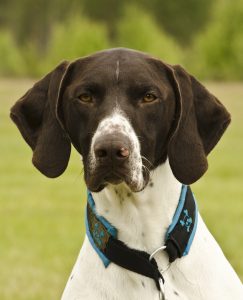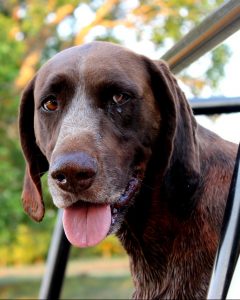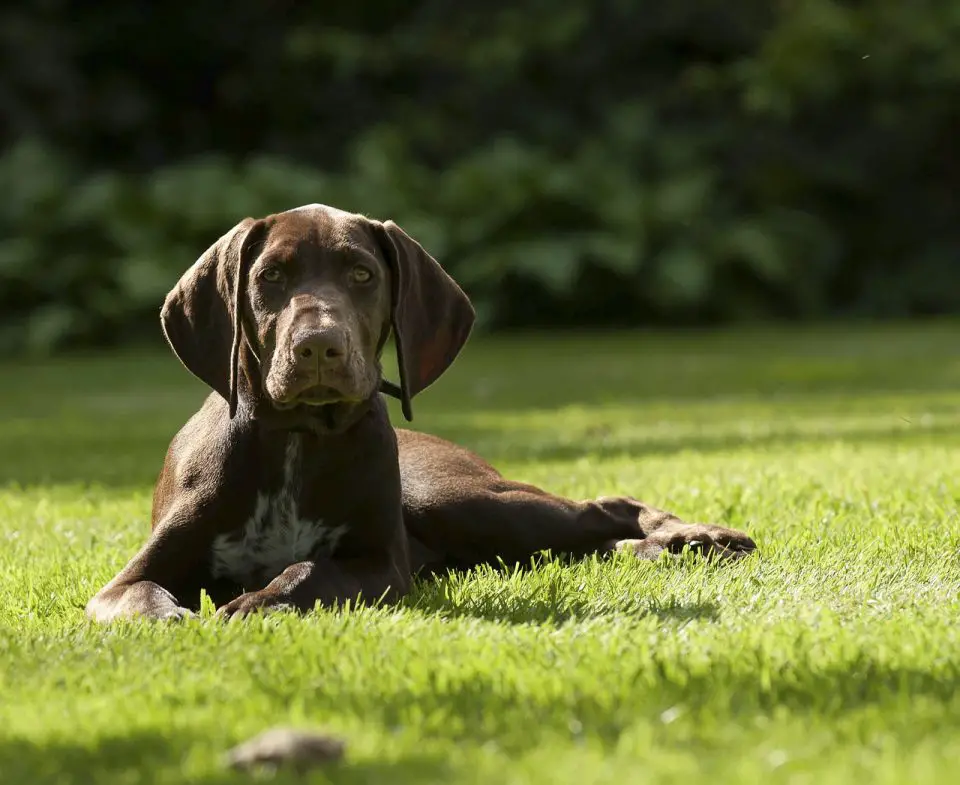When it comes to avoiding shedding, most owners pick a dog with thin, short hair in hopes that will save them from battling constant hairballs.
After all, shedding isn’t only a pain to clean up, but it can also be hazardous towards your health if you have allergies.
There are many breeds of short hair dogs, but, ranking at number 9 out of 193 according to the American Kennel Club, it’s clear to see that the German shorthaired pointer is a popular choice.
Friendly, smart, and eager to be your best friend, pointers make great companions and will spend their entire 10-12 year lifespan attempting to please you.
These traits aren’t new, however. German pointers have been trying to be man’s best friend for over two centuries.
History of the German Shorthaired Pointer
Compared to some other dog breeds which have been around for over a millennium, German shorthaired pointers have only been around since the 1800s.
These hybrids come from a long line of cross breeding of various breeds and varieties following the popularity of bird-hunting in the 1700s.
These dogs are nobles in the hunting realms, so it comes as no surprise that their formation involves a noble – Prince Albrecht zu Solms-Braunfels to be exact.
While the German pointer’s main prowess is hunting, that’s not the only reason that they’re a fan-favorite among dog owners: they’re also popular thanks to their sleek, unique coat.
What is a German Shorthaired Pointer’s Coat Like?
With it’s short, dense coat to protect it from the elements while hunting, the German shorthaired pointer lives up to its name.
The breed standard is pretty unsurprising: short, thick hair to protect the dog’s sensitive skin. There are some variations in both length and texture on the pointer’s cost, however.
You’ll find that, while the fur along the underbelly and tail is slightly longer and thicker, the fur in the facial and upper neck region is thinner and softer – perfect for petting.
The color of the fur varies between solid liver – which is a deep reddish brown – or a unique speckled pattern of liver and white.
Do German Shorthaired Pointers Shed?
In short, yes German Shorthaired Pointers do shed. While the fact that the German shorthaired pointers short coat may have you dreaming of days without lint rollers and dustpans full of shredded hair, it’s important to know that they do indeed shed – a lot.
How Much do German Shorthaired Pointers Shed?

The American Kennel Club lists German pointers as a ‘regular shedder’.
This means that, even when it isn’t shedding season, you’ll still need to give this magnanimous pup a weekly brushing to keep that hair from ending up, well, everywhere.
This, of course, varies due to multiple reasons, so you may find that you have to brush your German shorthaired pointer more than other owners.
When Do German Shorthaired Pointers Shed the Most?
While German pointers are regular shedders and will shed all year long, there are a few factors that play a big role in just how much and how often they shed.
While some of these are directly related to health issues that you should work to treat, most are generally harmless and should not be a cause for concern.
Time of Year
In the animal kingdom, there is a specific time known as a shedding season, and it means exactly what you think.
A shedding season is any time of year where an animal – dogs, cats, or even humans – shed more than usual.
For German shorthaired pointers, they, like most other dogs, experience their shedding seasons in the spring and fall.
While this may seem a bit random at first, think about it: during the summer, if a dog lived in the wild, it would need to stay cooler.
That means that they would want to have a thinner, shorter coat that will keep them cool when the temperatures rise while also protecting their skin from harmful UV rays.
Then, when winter comes, they need to shed this less useful coat to grow one that is dense and warm to keep them from freezing in the low temperatures.
Thus, in between these seasons, the German shorthaired pointer will need to shed its coat to prepare for the next season.
Location
Believe it or not, the climate where you live can affect how much your pointer sheds.
If you live in an area with warm weather year round, you’ll find that your pointer will shed consistently in order to maintain a short, cool coat.
Puppy Coat
Let’s think about a human baby for a moment. Have you ever seen a human baby that has that fine, silky hair?
Well, most of the time, once they get older, their hair type changes. Dogs are the same.
Their puppy coats are much different from their adult coats, but it doesn’t get like that overnight.
Around 6 months of age, you’ll notice an increase in shedding as your German shorthaired pointer matures and grows.
Health Issues
As mentioned before, there are quite a few health issues that can cause increases in shedding in your dog.
In order to treat the shedding, you’ll need to work to correct the health issues.
Poor Diets
You are what you eat is true for your dog too, and, if they have a poor diet, they’ll have a poor coat.
If your German shorthaired pointer’s coat is lackluster, easily broken, and shedding excessively, then you may want to take a look at their diet.
Make sure that they have quality food – hint, the first ingredient shouldn’t be a grain! – and that they are getting all of the vitamins and minerals they need.
Parasites or Pests
Fleas, ticks, or internal parasites can be a major cause of skin irritation that will lead to excessive scratching and self-grooming. Over time, this can cause your dog to shed.
How to Combat German Shorthaired Pointer Shedding?
After making sure that no health problems are at play, and you can assume that your pointer’s shedding habits are normal, you can work on combating their sheddage.
First, regular grooming is a must. This includes occassional bathing and frequent brushing. If this seems difficult, don’t worry, investing in a quality brush can help the brushing process go by in a flash.
A dual-side brush will help detangle knots while also working to remove dirt and debris and stimulate circulation, resulting in a clean, shiny, knot-free coat.
However, even with regular grooming, you may find that you still end up with hairballs gathering in the corners of your home or floating in the air around you.
Grooming your dog outside and investing in an air filter designed specifically for reducing dog hair and other pet related allergens will reduce the amount of fur that remains in your home – and therefore your lungs.
Are German Shorthaired Pointers Hypoallergenic?
No, German pointers are not hypoallergenic.
Actually, there are no dog breeds that are truly hypoallergenic, and that’s simply because of what allergies truly are.
You see, it’s a common misconception that people are allergic to a dog’s hair, but this simply isn’t true. What you’re actually allergic to is a protein in their saliva.
When your dog licks him or herself, these proteins bind to the dead skin that forms on the upper layer of your dog’s skin – known as the corneum layer of the epidermis, which acts as a protective barrier for your dog.
This layer will eventually shed off in what you know as dander.
You then inhale these dead skin particles mixed with protein, and it causes your body to produce histamine, a compound that is released by your cells and triggers an allergic reaction.
This means that the best way to prevent having an allergic reaction if you truly want a dog is to either prevent as much dander as possible through grooming or reduce the amount you inhale by purchasing a specialized air filter.
Final Thoughts
 German shorthaired pointers are one of the friendliest dogs.
German shorthaired pointers are one of the friendliest dogs.
They’re eager to please, making training a blast, and, with their beautiful, unique coat, you’ll love taking them on strolls and showing them off – which, due to their high energy levels, they’ll need.
They’ll also need quite a bit of grooming each week to help combat their regular shedding.
Thankfully, though, you won’t need to hire a professional: a quick bath and brushing each week will be enough to help reduce some of their shedding.
Investing in quality tools like a dual-sided brush will also help.
Just remember that no matter how well you groom your dog – no matter the breed – they will never be hypoallergenic.
This is due to the fact that it is not the hair that is the allergen as most people believe but the proteins in their salvia that binds to their dead skin cells – which, like hair, shed regularly.
Despite the extra grooming that goes into having a healthy, clean German shorthaired pointer, they’re well-tempered dogs and relatively easy to raise, making them a great addition to your family.
You may like Do German Wirehaired Pointers Shed?

